Keepod makes a complete operating system that fits on a USB device and can make old, refurbished computers act like new. It plans a campaign to offer low-cost computing to the two-thirds of the globe’s population that currently has little or no access. This BBC article shows the test bed for the project in the slums of Nairobi, Kenya, while omitting to mention the Israeli origin of the invention.(of course.)
Keepod: Can a $7 stick provide billions computer access?
By Dan SimmonsBBC
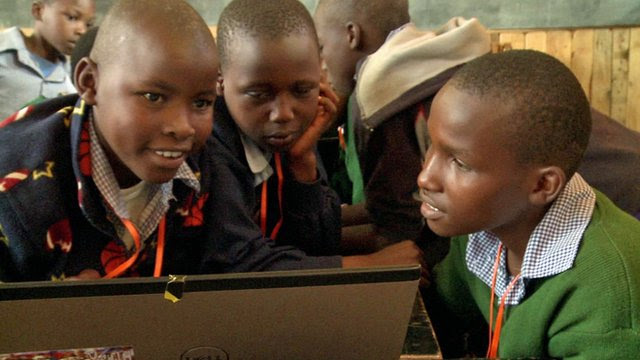
The USB flash drive is one of the most simple, everyday pieces of technology that many people take for granted.
Now it’s being eyed as a possible solution to bridging the digital divide, by two colourful entrepreneurs behind the start-up Keepod.
Nissan Bahar and Franky Imbesi aim to combat the lack of access to computers by providing what amounts to an operating-system-on-a-stick.
In six weeks, their idea managed to raise more than $40,000 (£23,750) on fundraising site Indiegogo, providing the cash to begin a campaign to offer low-cost computing to the two-thirds of the globe’s population that currently has little or no access.
The test bed for the project is the slums of Nairobi in Kenya.
The typical income for the half a million people in the city’s Mathare district is about $2 (£1.20) a day.
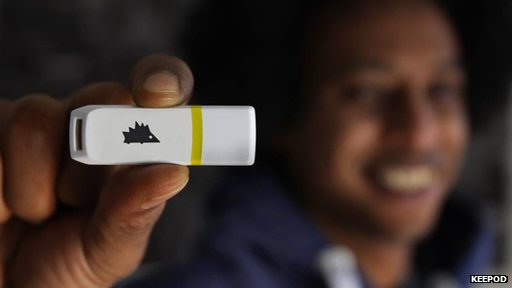 Keepod is Hebrew for the word hedgehog. It is also a play on words, as it joins the English word “keep” with the Hebrew word “od”, meaning “everything”.
Keepod is Hebrew for the word hedgehog. It is also a play on words, as it joins the English word “keep” with the Hebrew word “od”, meaning “everything”.Very few people here use a computer or have access to the net.
But Mr Bahar and Mr Imbesi want to change that with their Keepod USB stick.
It will allow old, discarded and potentially non-functional PCs to be revived, while allowing each user to have ownership of their own “personal computer” experience – with their chosen desktop layout, programs and data – at a fraction of the cost of providing a unique laptop, tablet or other machine to each person.
In addition, the project avoids a problem experienced by some other recycled PC schemes that resulted in machines becoming “clogged up” and running at a snail’s pace after multiple users had saved different things to a single hard drive.
The two men hope to get up to 150,000 people signed up to their idea in the country.
Day One
To do so, the pair have teamed up with LiveInSlums – a non-governmental organisation operating in Mathare – to introduce the flash drives to students and staff at WhyNot Academy.
Like other schools in East Africa, the school uses text books and chalk boards to teach.
Two years ago it was connected to the electricity supply.
During a visit to the school in March, Mr Bahar and Mr Imbesi decided to buy a router and a Sim card to hook the classrooms up to the internet.
Their solution involved hanging the router in a carrier bag nailed next to one of two plug sockets in the school.
It looked makeshift, but that didn’t prevent the children cheering when it was announced the academy had gone online.
The pair also brought five old laptops with their hard disks removed to the school.
As they gave each child one of the Keepod USB sticks to keep, they explained the second-hand computers would boot up directly from the flash drives.
 Keepod chose Nairobi’s Mathare district as the first place to get its device
Keepod chose Nairobi’s Mathare district as the first place to get its deviceIn fact, any computer with a screen, keyboard and basic processor should play a perfect host because each Keepod stick comes with a unique desktop version of Google’s Android 4.4 operating system on board.
The effect is to make any laptop or PC as simple to use as a smartphone, with icons displayed for each task or saved website that the user may want to see.
Each Keepod remembers its owner’s settings, passwords and websites visited.
It stores any files or programs downloaded on the other half of its 8GB storage capacity. The information can be encrypted and is protected by a password needed for operation when it’s plugged in.
“It makes it possible for anyone with a Keepod to use any computer and get the same experience,” says Mr Bahar.
“Each child will see their own files and apps appear in exactly the same way each time, without the need to remember lots of passwords.”
The amazement and excitement at seeing these old laptops come to life was palpable inside the classroom.
And the children stayed long after classes had ended to explore and set up their new devices.
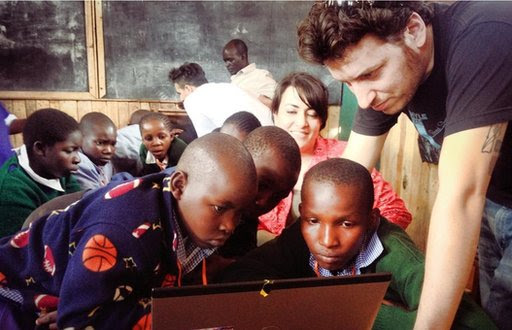 Keepod’s Nissan Bahar wants to allow a single machine to act as a personal computer to many
Keepod’s Nissan Bahar wants to allow a single machine to act as a personal computer to manyHead teacher, Dominic Otieno believes the technology will help change the children’s mind sets.
“It will help Africans help themselves, it will help them to start to learn the skills of business,” he says.
“They are going to learn to read the story of people who have made it from nothing, but through business, people who did not go through a lot of education but they made it.”
Before they left the school, there was more good news for the Keepod founders.
A teacher from the US had spotted their campaign and called mid-visit to say he would pay for more USB drives to be distributed in Nairobi if the founders also provided copies for pupils at his school.
The idea, he explained, would be that the children on each continent could communicate together and share a common experience.
Malware risk
Keepod is never going to be a huge money-spinner, but the idea is that it will eventually support itself.
Mr Bahar and Mr Imbesi’s plan is for locally employed workers to buy the flash drives on the open market, install the operating system and a few essential apps, and then sell them on for a small gain.
The final price would be $7 (£4.15), delivering about a $2 profit on each device that would help cover wages and the further expansion of the project.
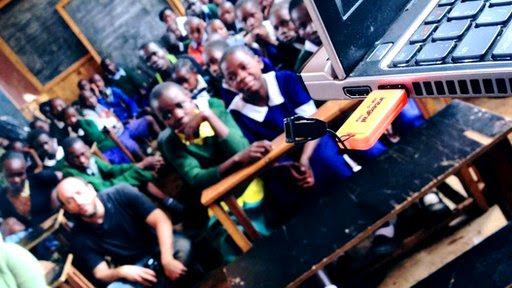 Keepod’s software will run off any brand of USB stick if it has enough storage
Keepod’s software will run off any brand of USB stick if it has enough storageThey explain an added benefit of their scheme over alternative computer-donation efforts is that even if a Keepod owner has their device infected with malware, it should not be able to spread to the host computer – meaning one person’s misfortune should not affect others.
The start-up also plans to provide a Keepod back-up facility, offering a way to protect owners from losing their files if the USB device is lost or becomes corrupted.
Unwanted sales
Rita Anyango is one of the five people Keepod has trained up to maintain the Mathare project.
She likes the unique way in which the scheme, unlike others she has worked on, offers ownership of the computing experience to each user.
But she but fears that some parents may be tempted to trade the devices to put more expensive food on the family table, like meat, if they don’t realise its long-term potential.
The tiny devices could be exchanged or worse stolen, she says, if they’re not looked after.
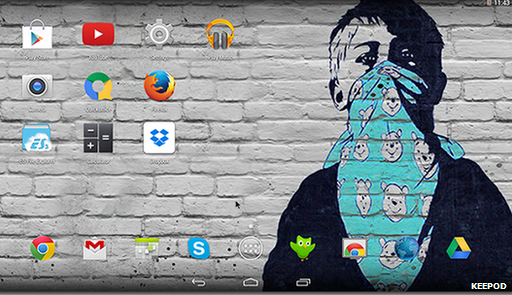 Keepod is based on Android, allowing it to run on even low-powered notebook computers
Keepod is based on Android, allowing it to run on even low-powered notebook computersTony Roberts, former chief executive of the global charity Computer Aid International, also has concerns.
He warns it would be over-optimistic to place too much belief in technology being able to simply solve problems like improving education or making agriculture more efficient.
“In my experience it’s always about how the people use the technology and not that technology itself as a magic bullet,” he says.
“People will need to be trained and as more flash drives are sold even more people will need training, and more computer hubs will need more maintaining.
“Finding the resources to fund that within a $7 price tag will be tough.”
He also makes a more pressing point. That most people in rural areas of the world are poor and it’s in those areas where electricity and connectivity are often bigger challenges. Without those basics the scheme won’t work.
Even so, he wishes the project well and would personally back it.
Next steps
Keepod’s founders’ next plan to roll it out to India, Israel, southern Italy, and other parts of sub-Saharan Africa.
 The Keepod team want to take their device beyond Nairobi to other parts of the world
The Keepod team want to take their device beyond Nairobi to other parts of the worldTo help do so, they intend to sell starter packs so that anyone can supervise their own scheme with some old laptops and a bunch of cheap USB drives.
They’ll be driven on by memories of the many smiling faces at the celebration thrown in Mathare to mark WhyNot Academy receiving the devices.
Here, at least, the party has already begun.
http://www.bbc.co.uk/news/



Israelis are improving the quality of life for Africans, while muslims are using African children as sex slaves. But Israel is treated as the pariah state subjected to boycotts. Go figure.
Supplementing my comment, I notice it uses Android, so I suppose it makes an old computer act like one of the Chrome computers being sold in the west today. I think you need access to the internet to take advantage of all the applications. I wonder how they deal with that problem.
This brings to mind the history of the very substantial humanitarian involvment of Israel in Africa. There’s a reason Kenya permitted Israeli plans to land and refuel in Kenya during the Entebbe rescue. Last night I was doing some reading about a radical pan-African group that started in the 1970’s, and was led for a while by the late Stokely Carmichael. It was the All African Peoples Revolutionary Party. It espoused the ideals of Sekou Toure, deposed leader of Guinea, and Kwame Nkrumah. It decried Zionism. Yet few realize, that Israel was an early friend of the independent state led by Nkrumah, assisting in the development of the national airlines and the Black Star Shipping Line that Zim helped start and run, before selling its interest to Ghana. The left and, especially the far-out “revolutionary” and “third-world” left, is mindless.
This innovation utilizes, in turn, another Israeli innovation, the thumb drive itself. Google “thumb drive,” read the wikipedia article, and you’ll find out about the early work of M-Systems which worked with IBM to produce the first drive.
I’m just guessing this interesting product, the Keepod, uses a lite version of Linux. I’m not an expert, but I can’t imagine what else it could be. I think there are versions you can find that you can use in your own computer, nevertheless, to bring this to the continent would be wonderful if it can help educate the most deprived and disadvantaged. It would be interesting to find out more about what motivated these young innovators to do this. I guess another problem would be getting obsolete computers out into the areas of need, so that the drive can be used.
@ the phoenix:
Loki is the Norse god of mischief and fire.
@ the phoenix:
@ yamit82:
Male Robin is attempting to mate with a female on my Ramada [Spanish for Succoth},he keeps chasing her from branch to branch. She was one step ahead of him avoiding him at his every until she left him, frustrated and angry, and flew off. He just stood there a moment lookin stupid and, of course, followed her. Didn’t I send you boys that Waylon Jennings song.” Women Always Carry On”.
@ yamit82:
http://youtu.be/D36JUfE1oYk
the phoenix Said:
Sends his regards!!! He need a mate. Looking for one.
@ yamit
Speaking of keepod, how is yours doing?
The miracles from Israel just keep on coming and coming! The more Israel does to help the world the more Israel is hated by the forces of evil and that includes the bitter Jewish leftists. I hope that the programs also inform the users that this amazing innovation comes from Israel.